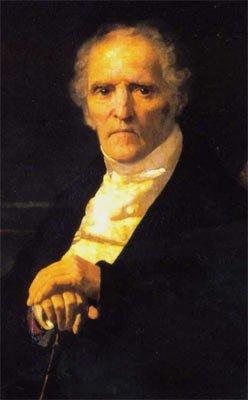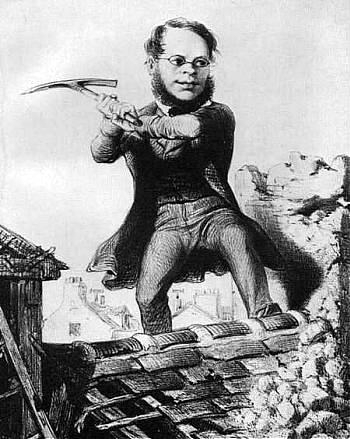Here are some excerpts from Shawn Wilbur’s final contribution to the Center for a Stateless Society’s forum on anarchy and democracy. It begins with a reference to David Graeber’s social anarchist approach to democracy, which emphasizes alternative conceptions of participatory democracy, drawing on various peoples’ actual practices of non-hierarchical collective decision-making, and then discusses a Proudhonian approach to anarchy and democracy, which provides a place for certain “democratic practices” within the context of Proudhon’s concepts of “self-government” and voluntary federation. I included several selections from Proudhon on workers’ self-management, anarchy and federalism in Volume One of Anarchism: A Documentary History of Libertarian Ideas. I discuss the historical development of anarchist approaches to anarchy, democracy, organization and federalism in ‘We Do Not Fear Anarchy – We Invoke It’: The First International and the Origins of the Anarchist Movement.
Anarchy and Self-Government
As the market advocates among us are almost certainly aware, it is a common trope among Graeber-inspired anarchists that people only turn to counting and calculation as a means of organizing themselves when society (characterized in this view by a basis in communism and informal democracy) begins to break down. And that reading seems generally faithful to Graeber’s variety of social anarchism, at the core of which is a faith that people can work things out without recourse to mechanisms like market valuation or vote-taking…
I then want to undertake a limited defense of democratic practices, including voting, in a way that draws on Proudhon’s later works and, in a sense, completes the argument against the democratic principle…
I would simply like to pick out one aspect of Proudhon’s theory—his frequent use of the English term self-government among the synonyms for anarchy—and propose the bare outline how anarchic self-government might function in practice.
Let’s figure out how we might build a road, or undertake similar projects, using the principle of federation and the sociology of collective force. Readers can then determine whether the distinctions that I have been proposing do or do not actually make a difference. I’ll structure the sketch around four basic observations about social organization:
- The importance of specific decision-making mechanisms or organizational structures to the organization of a free society is almost certainly overestimated. If we are considering building a road, then there are all sorts of technical questions to be answered. We need to know about potential users, routes, construction methods, ecological impacts, etc.—and the answers to all of these questions will significantly narrow the range of possible proposals. We need to make sure that the plans which seem to serve specific local needs can be met with local resources, which will further narrow the possibilities. And in a non-governmental society, there can be no right to coerce individuals in the name of “the People,” nor can there be any obligation for individuals to give way to the will of the majority—and this absence of democratic rights and duties must, I think, be recognized, if the society is to be considered even vaguely anarchistic—so new limitations are likely to appear when individuals feel that their interests are not represented by proposals.
The simplest sort of self-government, where individuals simply pursue a combination of their own interests—including, of course, their interests as members of various social collectivities—and the knowledge necessary to serve them, will either lead to proposals that are acceptable to all the interested parties or they will encounter some obstacle that this sort of simple self-government appears unable to overcome. This second case is presumably the point at which a vote and the imposition of the will of the majority might seem useful. But what is obvious is that such a resolution does not solve the problem facing this particular polity. This sort of democracy is what happens when the simplest sort of self-government—which is probably not worth calling government at all—breaks down, and it involves relations that seem difficult to reconcile with the notion of self-government.
But perhaps this very simple self-government revolves around the wrong sort of self.
- The “self” in anarchic self-government is neither simply the human individual, nor “the People,” understood abstractly, but some real social collectivity. The vast majority of Proudhon’s sociological writings actually relate to the analysis of how unity-collectivities, organized social groups with a unified character, emerge and dissolve in society, but what is key for us to note here is that we are not talking about abstract notions like “the People.” Instead, if we are talking about a sort of social self-government, it would seem that the avoidance of exploitation and oppression is going to depend on carefully identifying real collectivities to which various interested parties belong. While “the People” may find their mutual dependence a rather abstract matter, the more precisely we can identify and clarify the workings of specific collectivities, the less chance there should be that purely individual interests undercut negotiations among the members of those collectivities.
One of the important elements of Proudhon’s sociology is his recognition that collectivities may have different interests than the strictly individual interests of the persons of which they are composed. That means that individuals may find themselves forced to recognize their own interests as complex and perhaps in conflicts, depending on the scale and focus of analysis. This may mean, for example, that there will be hard choices between the direct satisfaction of individual desires and various indirect, social satisfactions. But it should also mean that the more strictly individual sorts of satisfaction cannot be neglected when members are thinking about the health and success of the group.
To the extent that real collectivities can be identified, and decisions regarding them limited to the members of those collectivities, negotiations can be structured quite explicitly around the likely trade-offs. To the extent that the health and success of the collectivity depends on lively forms of conflict among the members (and Proudhon made complexity and intensity of internal relations one of the markers of the health—and the freedom—of these entities), then the more conscious all members must be of the need to maintain balance without resorting to some winner-take-all scenario.
It will, of course, not always be possible to resolve conflict by bringing together a single collectivity. There will be issues that can be resolved through additional fact-finding or compromises within the group, but there will be others that call for the identification of other groups of interested parties, whether in parallel with the existing groups, addressing different sorts of shared interests, at a smaller scale, addressing interests that can be addressed separately from the present context, or on a larger scale, addressing issues shared by the given group and other groups as well. We can already see how this analysis leads to federalism as an organizing principle, but perhaps it is not quite clear how and why these various groups might be constituted.
- The “nucleus” of every unity-collectivity is likely to be a conflict, problem or convergence of interests. One of the consequences of breaking with the governmental principle ought to be the abandonment of the worldview that sees society always present as “the People,” a fundamentally governmental collectivity always present to intervene in the affairs of individual persons. While there might be a few institutions of self-government that enjoy a perpetual existence, anarchists should almost certainly break with the notion that that each individual is obliged to stand as a citizen of some general polity whenever called to account for themselves.
Instead, the principle of voluntary association and careful attention to real relations of interdependence ought to be our guides. And the rich sort of self-interest we’ve been exploring here ought to serve us well in that regard. To abandon the assumptions of governmentalism and take on the task of self-government is going to be extremely demanding in some cases, so we might expect that individuals will desire to keep their relations simple where they can, coming together to form explicit associations only when circumstances demand it—and then dissolving those association when circumstances allow.
Where existing relations seem inadequate to meet our needs and desires, then some new form of association is always an option—and with practice hopefully we will learn to take on the complex responsibilities involved. Where existing relations seem to bind us in ways that stand in the way of our needs and desires, we’ll learn to distinguish between those existing associations which simply do not serve and those of a more fundamental, inescapable sort—and hopefully we will grow into those large-scale responsibilities from which we cannot extricate ourselves. Conventions for the use of property, the distribution of revenue and products, the mechanics of exchange, etc. can probably be approached in much the same way we would approach the formation of a new workgroup, the extension of a roadway, the establishment of sustainable waste or stormwater disposal, etc.
- Organization, according to the federative principle, is a process by which we identify—or extricate—specific social “selves,” on the one hand, or establish their involvement in larger-scale collectivities, on the other, and establish the narrow confines within which various “democratic” practices might come into play. If we are organized in anarchistic federations, then we can expect that organization to be not just bottom-up, but very specifically up from the problems, up from the local needs and desires, up from the material constraints, with the larger-scale collectivities only emerging on the basis of converging interests. Beyond the comparatively temporary nature of the federated collectivities, we should probably specify that we are talking about a largely consultative federalism, within which individuals strive to avoid circumstances in which decision among options is likely to become a clear loss for any of the interested parties. If we are forced by circumstances to resort to mechanisms like a majority vote, then we will want to contain the damage as much as possible. But I suspect we will often find that the local decisions that are both sufficiently collective and divisive to require something worth calling “democratic practices,” but also sufficiently serious to push us to confrontations within local groups may find solutions through consultation with other, similar groups. Alternately, if the urgency is not simply local—if, for example, ecological concerns are a factor—they may find themselves “solved,” not by local desires at all, but by consideration of the effects elsewhere.
Taking these various observations together, it should be clear that I do indeed believe that sometimes we will be required to fall back on familiar sorts of democratic practices, but I hope it is also clear why, in very practical terms, I believe that this will constitute a failure within an anarchist society.
Shawn Wilbur








































